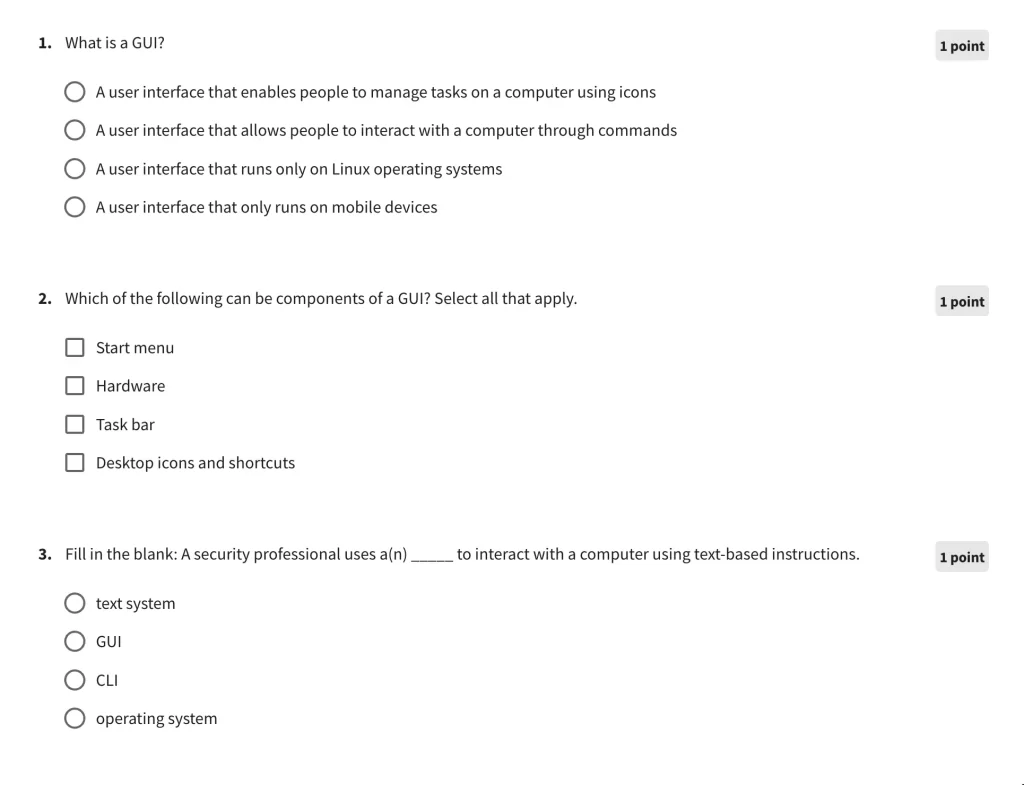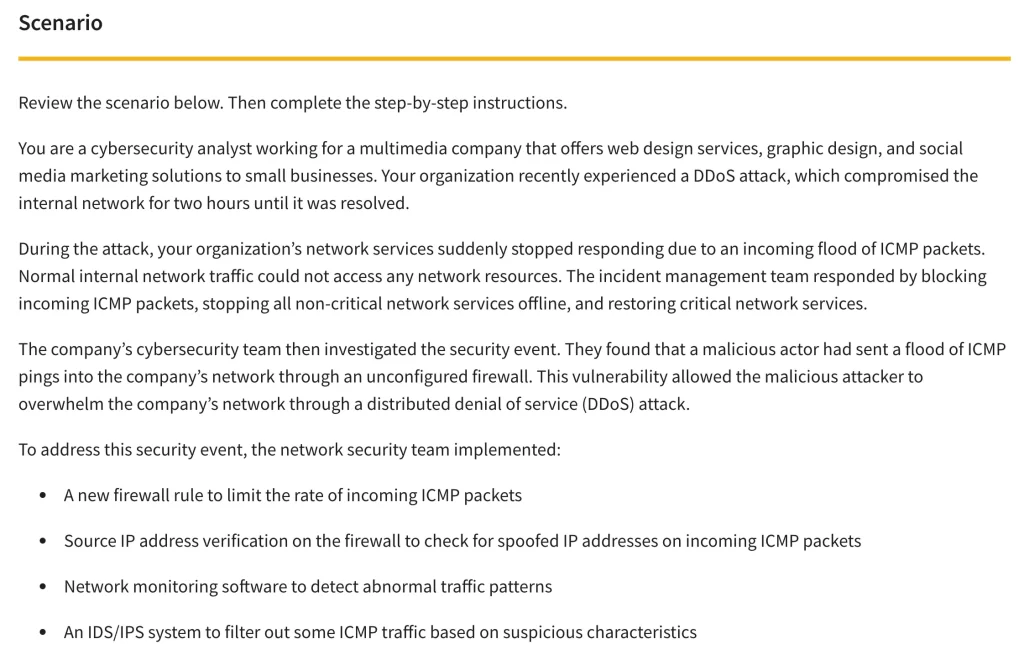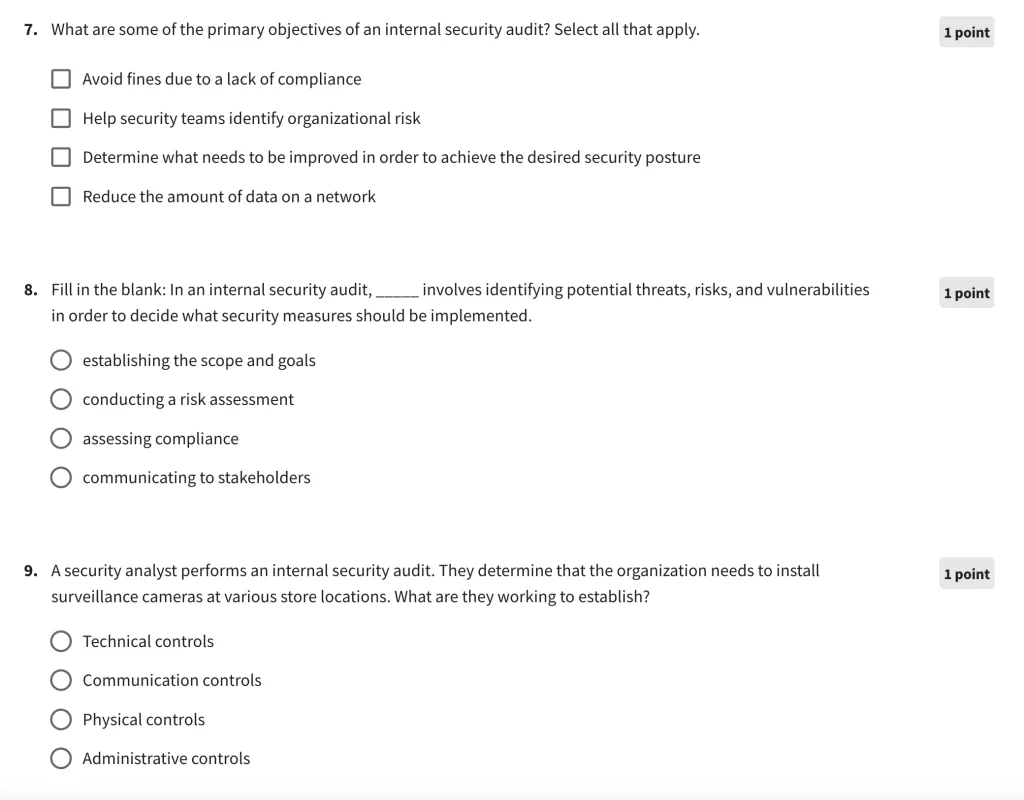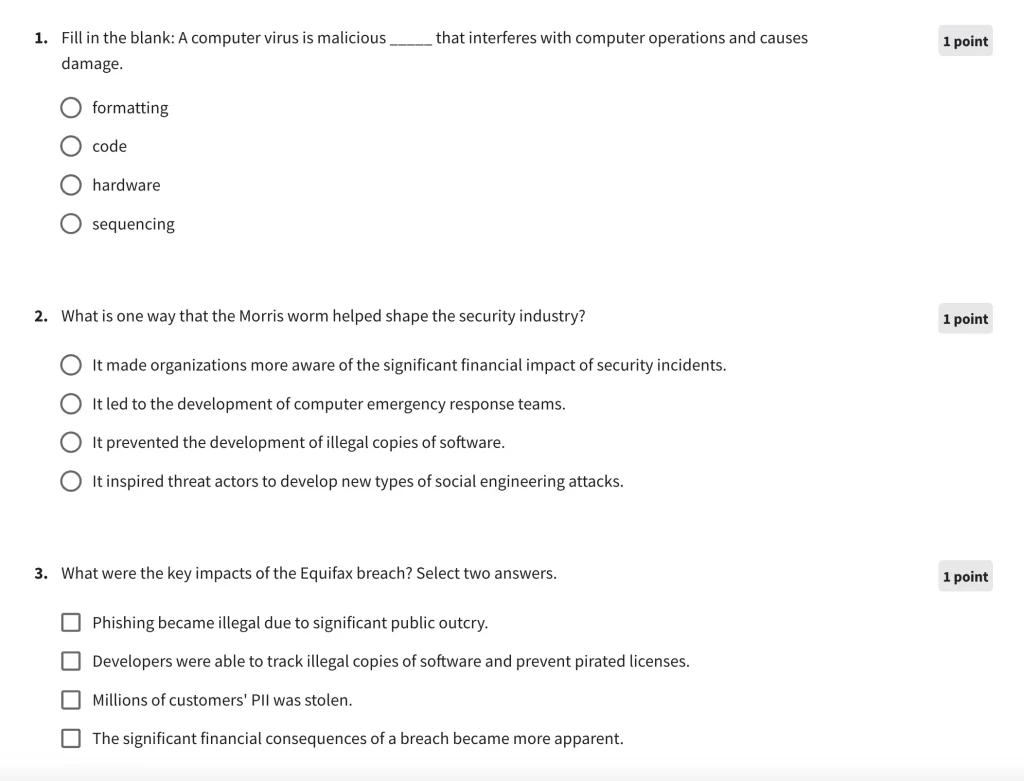- What Is Google Cybersecurity Certification?
- Is the Google Cybersecurity Certification Worth it?
- How Much Does It Cost?
- How Hard is the Google Cybersecurity Certification?
- What You'll Learn?
- Certificate Contents
- Google Cybersecurity Certification Exams
- Other Google Career Certifications
- Other Cyber Security Certifications Worth Pursuing
I recently completed the Google Cybersecurity Professional certificate, and in this review, I will share my experience with the lessons and platform in general. I will also share some tips for passing the exams and completing the certificate faster.
Let's start with the basics: what is this certification about, and what can you expect?
What Is Google Cybersecurity Certification?
The Google Cybersecurity Certificate is an entry-level professional certification that prepares students for entering the cybersecurity industry as cybersecurity analysts, security analysts, cyber defense analysts, and other related jobs.
Google employees prepare the lessons, which are delivered through Coursera. Anyone can take this course and get certified without cybersecurity experience or a related degree.
Once you finish this course, you can also attempt to pass the CompTIA Security+ exam and get the industry-leading CompTIA Security certification.
The certificate includes eight courses and takes less than 6 months to complete.
The cost is affordable (less than $300), and the material is easy to follow yet comprehensive and up-to-date. The latest update of the course includes dedicated lessons on how to use AI in cybersecurity to do your work faster and more efficiently.
Is the Google Cybersecurity Certification Worth it?
Google is not known as a cybersecurity leader, which makes many people wonder if they should take this course or get a certification from an industry leader like CompTIA or IBM.
Here is the thing: if you're looking for an entry-level certification that will prepare you for a career in Cybersecurity, this is a great choice.
Google created the Cybersecurity professional certificate to help students without experience get into the industry and secure a job. Then, you can advance your career by pursuing more advanced certifications and job roles.
Throughout the course, you will work on various projects to help you build your portfolio, which is essential when applying for jobs. In addition, Google certificates are recognized by employers worldwide, and through the Google Job Board, you can apply for jobs in more than 150 participating companies.
In terms of potential, the cybersecurity industry is growing rapidly, and companies constantly look for cybersecurity analysts earning annual salaries of $ 80K - $160K.
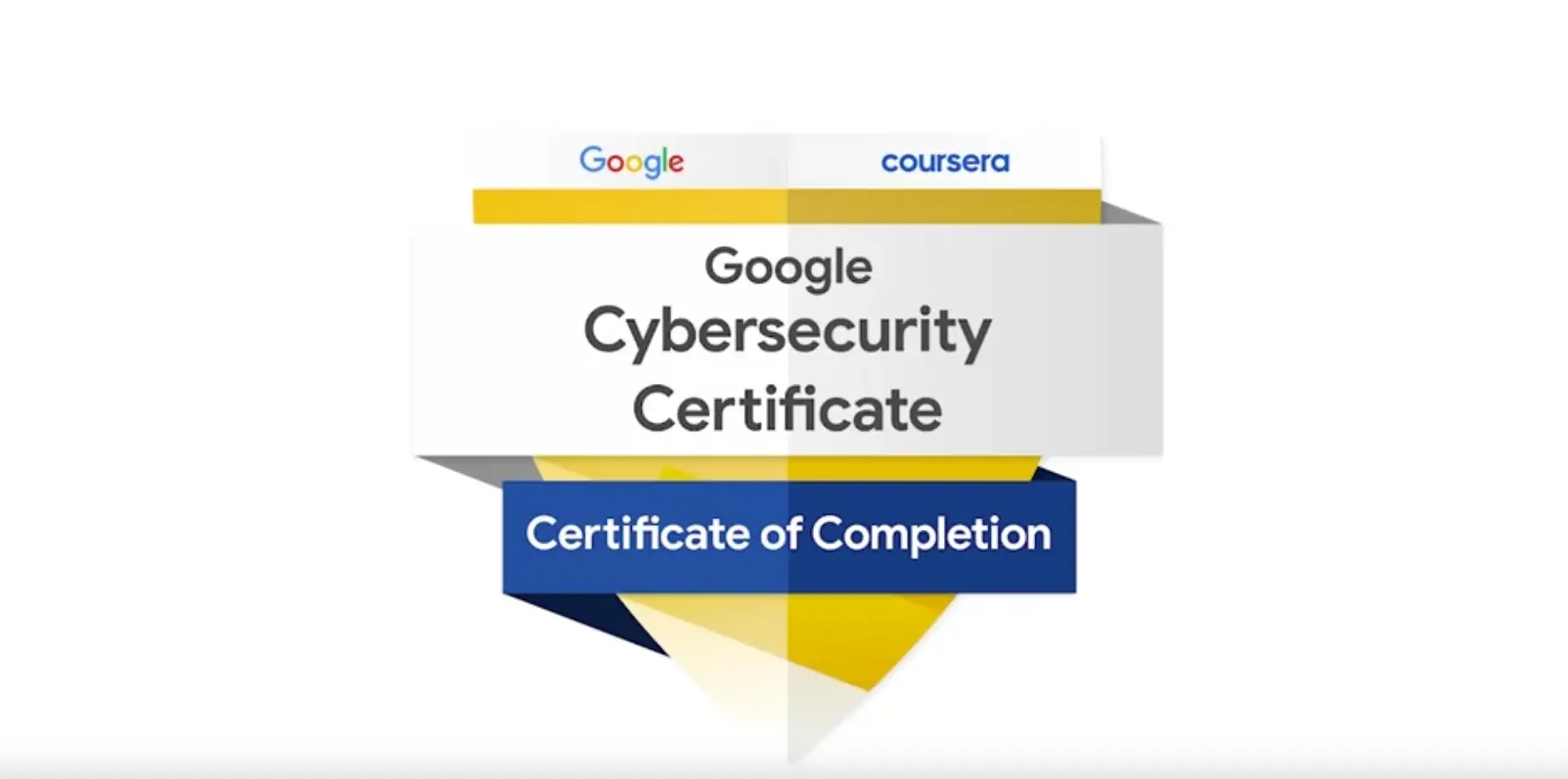
How Much Does It Cost?
The total cost for the Google Cybersecurity Certification is $294. Coursera offers the course through a $49-per-month Coursera Plus subscription. With a Plus subscription, you can access this course and many others (including other Google Career Professional Certificates).
On average, it takes students 6 months (6 X $49), allocating 7 hours per week, to complete the course and become certified. I completed the course in 3 months, but I had some experience with Cybersecurity that allowed me to finish some lessons faster than the estimated time.
You must complete all lessons, quizzes, and assignments to get certified. Quizzes are marked and need a passing score of 80% and above. Assignments are not marked, and you're also given the solutions after you submit your work.
You can enroll in the course for free and take advantage of Coursera's 7-day free trial, which allows you to review the course material before committing to a paid plan.
How Hard is the Google Cybersecurity Certification?
The Google Cybersecurity Certificate is not hard to get. Yes, I'm not a complete beginner, but the lessons are easy to follow, and the assignments are straightforward.
This is a professional certification for building job-ready skills, not a course you take as part of a University degree. The exams (see some samples below) are created to test your knowledge, and they don't try to trick you through confusing questions.
The only challenging course is the Automate Cybersecurity Tasks with Python. From my experience, people with no programming background may find coding courses cumbersome, especially in the beginning lessons.
Nevertheless, if you're willing to put in the required effort, nothing will stop you from finishing this course and the other seven courses in this certificate program.
What You'll Learn?
During the 8 courses in this certificate program, you'll learn what it takes to work as a Cybersecurity expert. You'll know what the job entails and what tools and techniques to carry out related cybersecurity tasks.
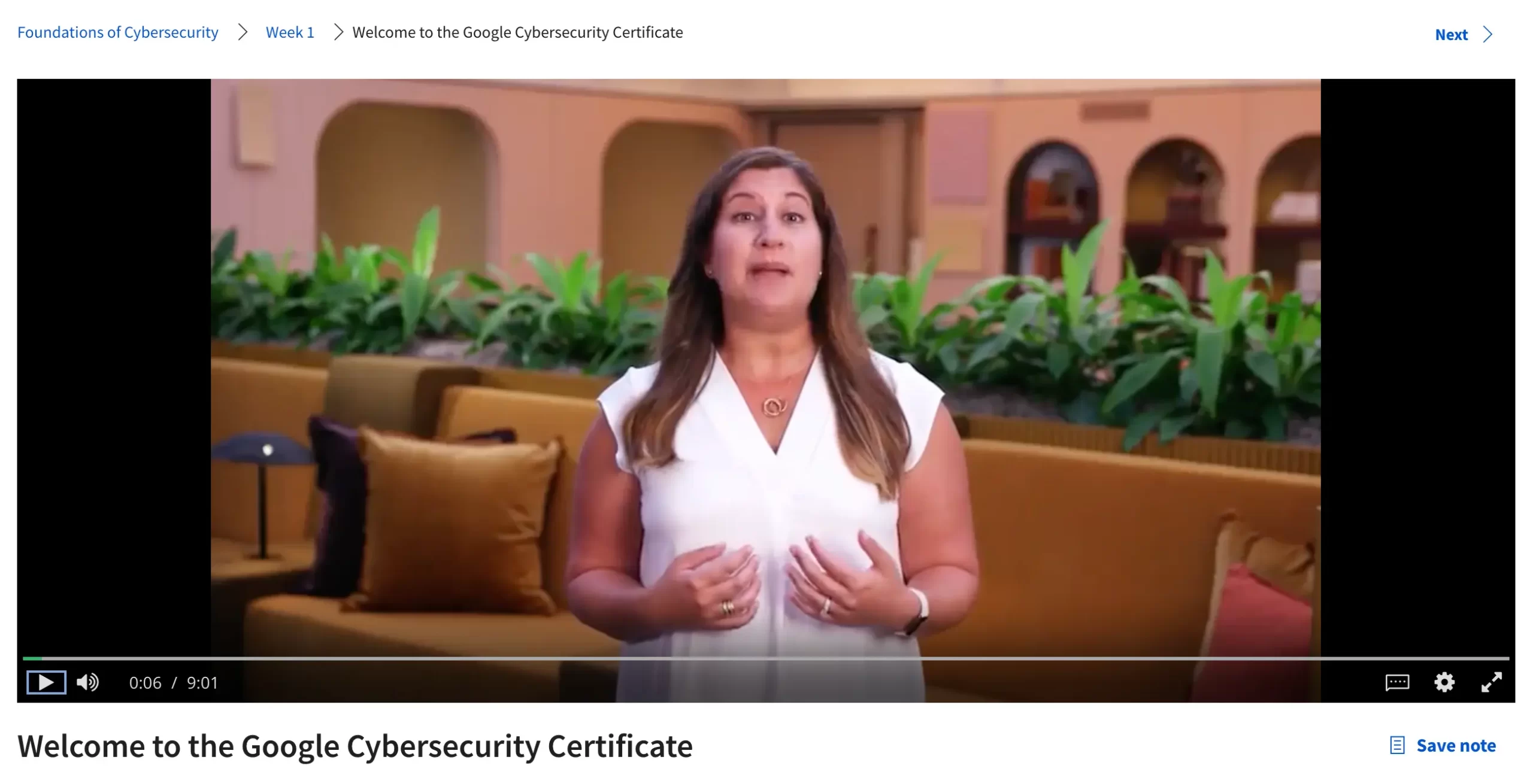
- What cyber security is and why it's crucial for all kinds of businesses
- How to implement security controls to protect devices, people, and data from cyberattacks
- Which tools to use to identify risks and mitigate threats and vulnerabilities
- How to use Python, Linux, and SQL to perform various cybersecurity tasks
- How to find and apply for cybersecurity jobs
- How to prepare for a job interview
- How to use AI to perform cybersecurity tasks
Certificate Contents
The Google Cybersecurity certification includes eight online courses.
Here is a detailed breakdown of the course contents to give you an idea of what the lessons look like and what specific topics they cover.
- Foundations of Cybersecurity (13 hours)
- Play It Safe: Manage Security Risks (12 hours)
- Connect and Protect: Networks and Network Security (14 hours)
- Tools of the Trade: Linux and SQL (25 hours)
- Assets, Threats, and Vulnerabilities (21 hours)
- Sound the Alarm: Detection and Response (21 hours)
- Automate Cybersecurity Tasks with Python (27 hours)
- Put It to Work: Prepare for Cybersecurity Jobs - Includes AI Skills (15 hours)
1. Foundations of Cybersecurity (13 hours)
The Foundations of Cybersecurity is an introductory course to the program. The learning material is 14 hours long but can be completed in less time.
In week 1, you'll learn about what each course covers and what skills and knowledge are needed to become a security analyst.
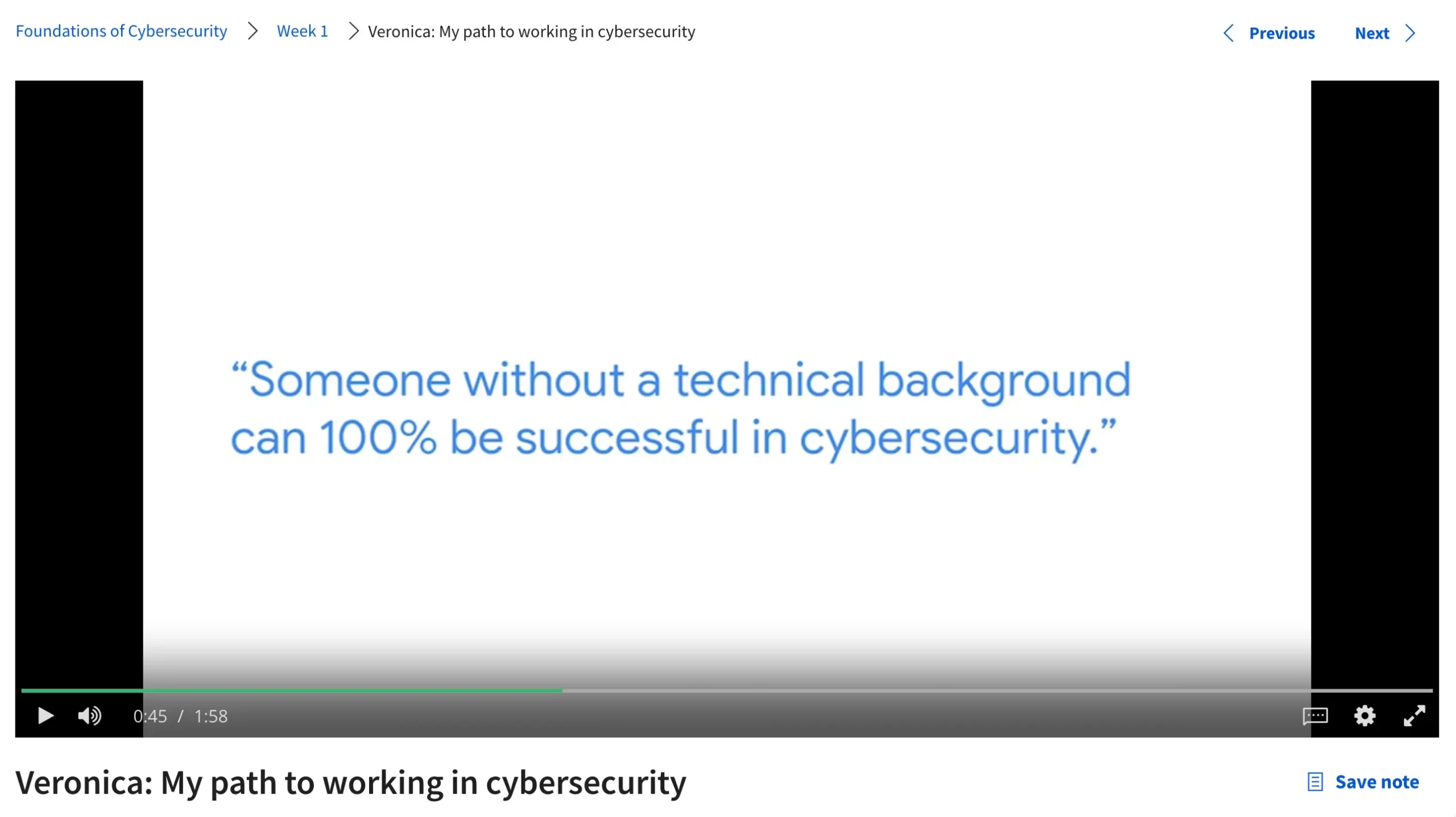
In week 2, you'll be introduced to the different cyber-attack types and what each type does.
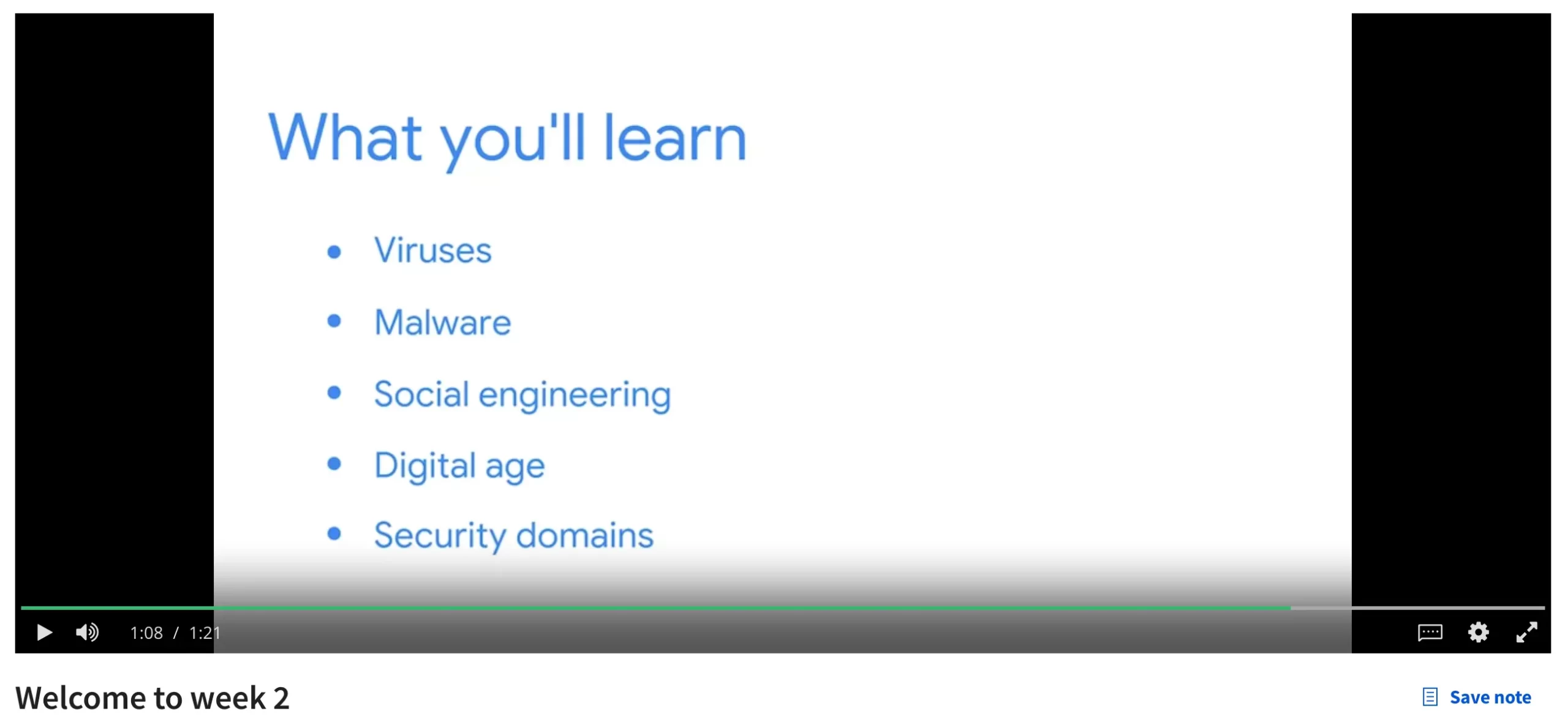
In week 3, you'll learn about the security frameworks of the CIA triad and NIST and how they are used to prevent security attacks.
In the last week, you will learn about Linux, SQL, and Python and their roles in cybersecurity.
It is worth mentioning that the material is easy to digest for beginners. The instructors did a great job of explaining Cybersecurity in simple terms.
Here is a detailed breakdown of the first course's lessons.
| Period | Topic | Time To Complete |
|---|---|---|
| Week 1 | Welcome to the exciting world of cybersecurity | 4 hours |
| Week 2 | The evolution of cybersecurity | 3 hours |
| Week 3 | Protect against threats, risks, and vulnerabilities | 3 hours |
| Week 4 | Cybersecurity tools and programming languages | 4 hours |
2. Play It Safe: Manage Security Risks (12 hours)
In the second course, you'll learn about CISSP security domains. In simple terms, these are the eight different areas related to cybersecurity that a security analyst may have to deal with.
Security domains include risk management, data security, network security, and identity management.
As part of Week 1, you'll also learn the story of Asley and how she became a Security professional at Google after serving in the Army. It's an inspiring story for anyone who wants to make a career switch without having prior experience.
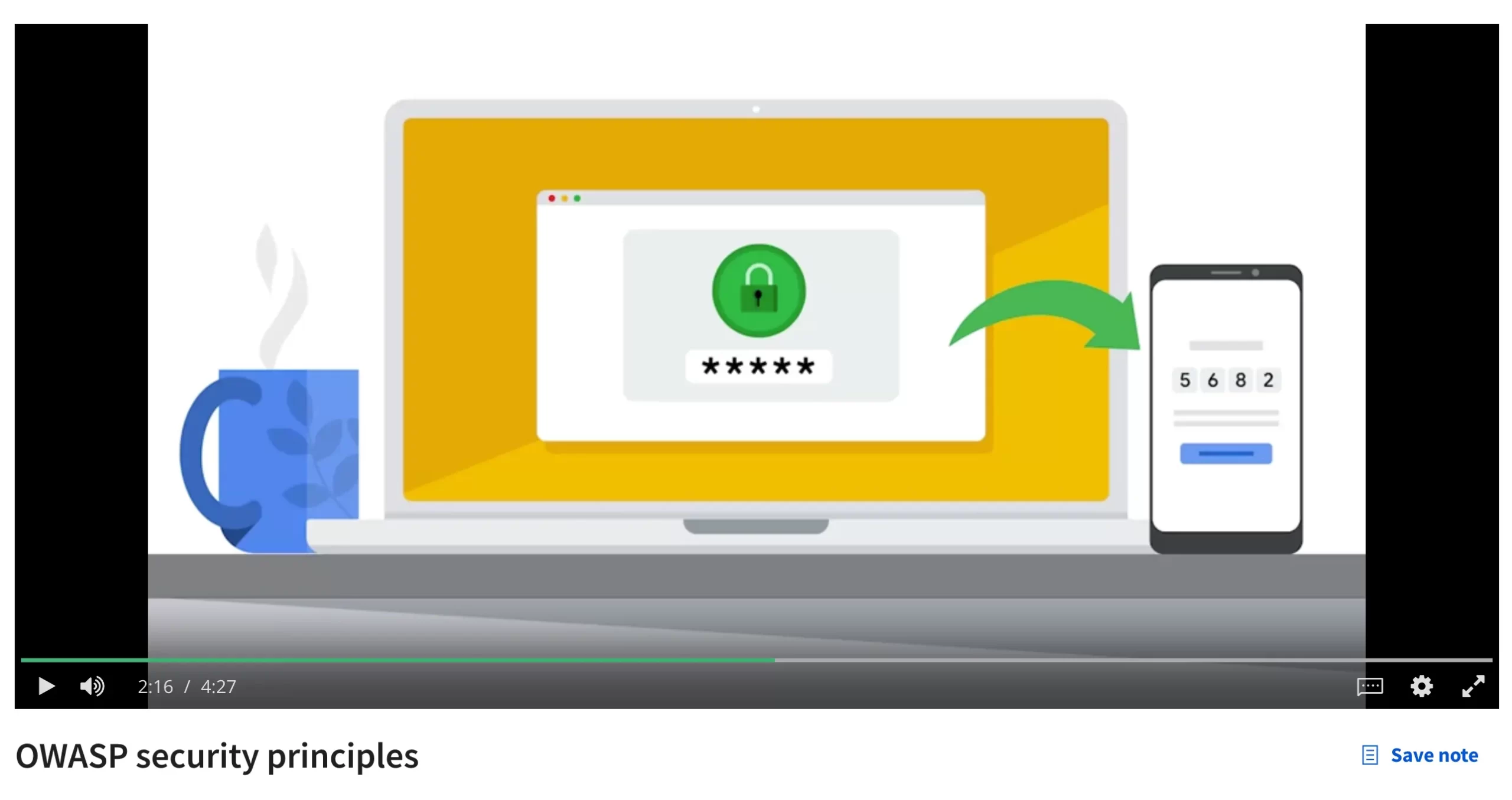
In week 2, you'll learn about Open Web Application Security Project (OWASP) security principles and security audits. You'll be given the exact framework for planning and executing a security audit.
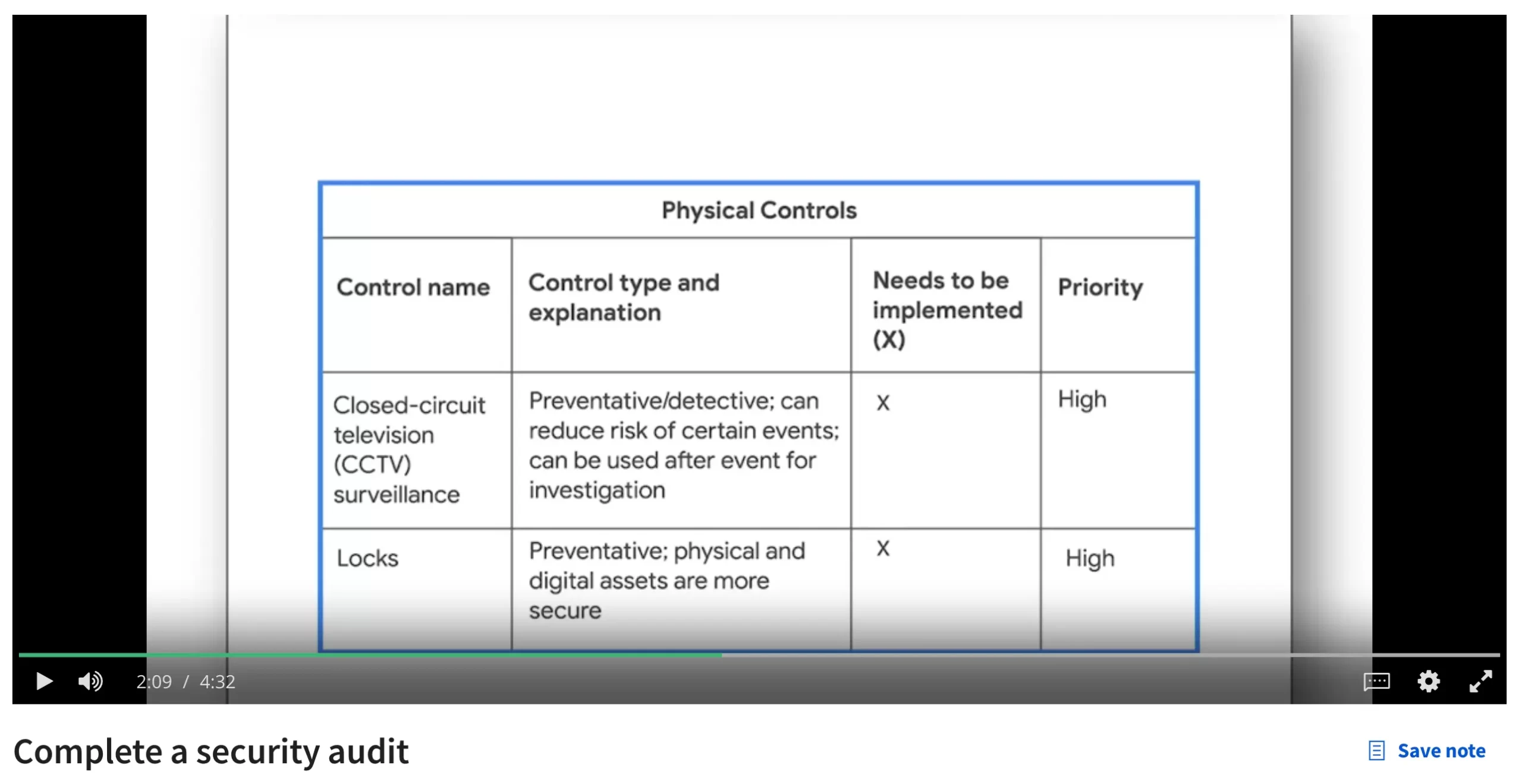
As part of the assessment, you will have to complete your first portfolio activity, which is a controls assessment and compliance checklist to identify ways Botium Toys (a fictional company) can improve its IT security.
For this and all other activities, you'll be given step-by-step instructions on how to complete the task. After you submit your work, you can also access the exemplar, which is the ideal solution.
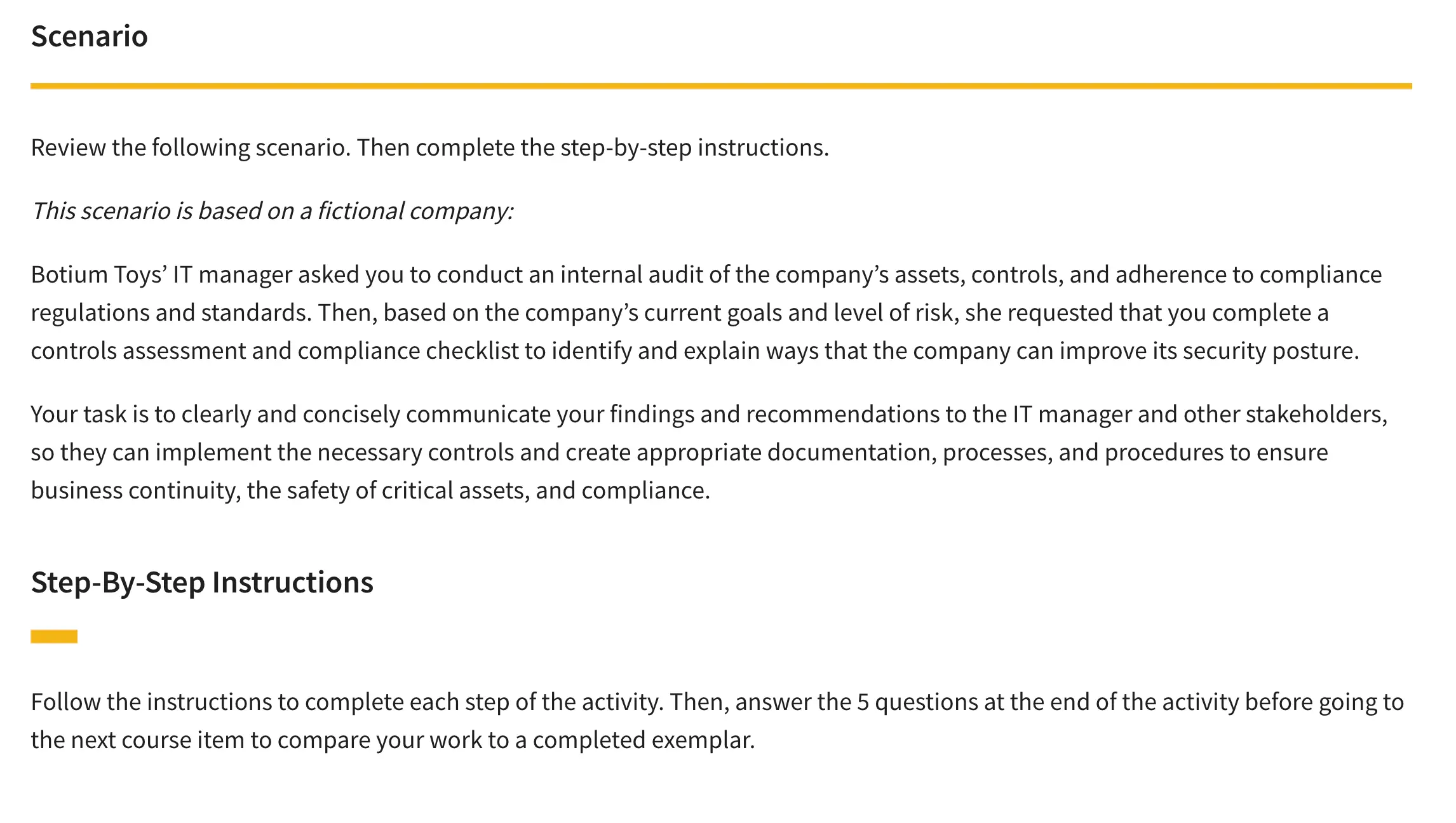
Here is a complete breakdown of the topics covered in this course.
| Period | Topic | Time To Complete |
|---|---|---|
| Week 1 | Security domains | 3 hours |
| Week 2 | Security frameworks and controls | 4 hours |
| Week 3 | Introduction to Cybersecurity Tools | 2 hours |
| Week 4 | Use playbooks to respond to incidents | 3 hours |
3. Connect and Protect: Networks and Network Security (14 hours)

Networks and Network Security is the third course on your path to becoming a certified Google Cybersecurity professional.
The course starts with an introduction to networks and how they work. Then, it explains network communication protocols and network infrastructure.
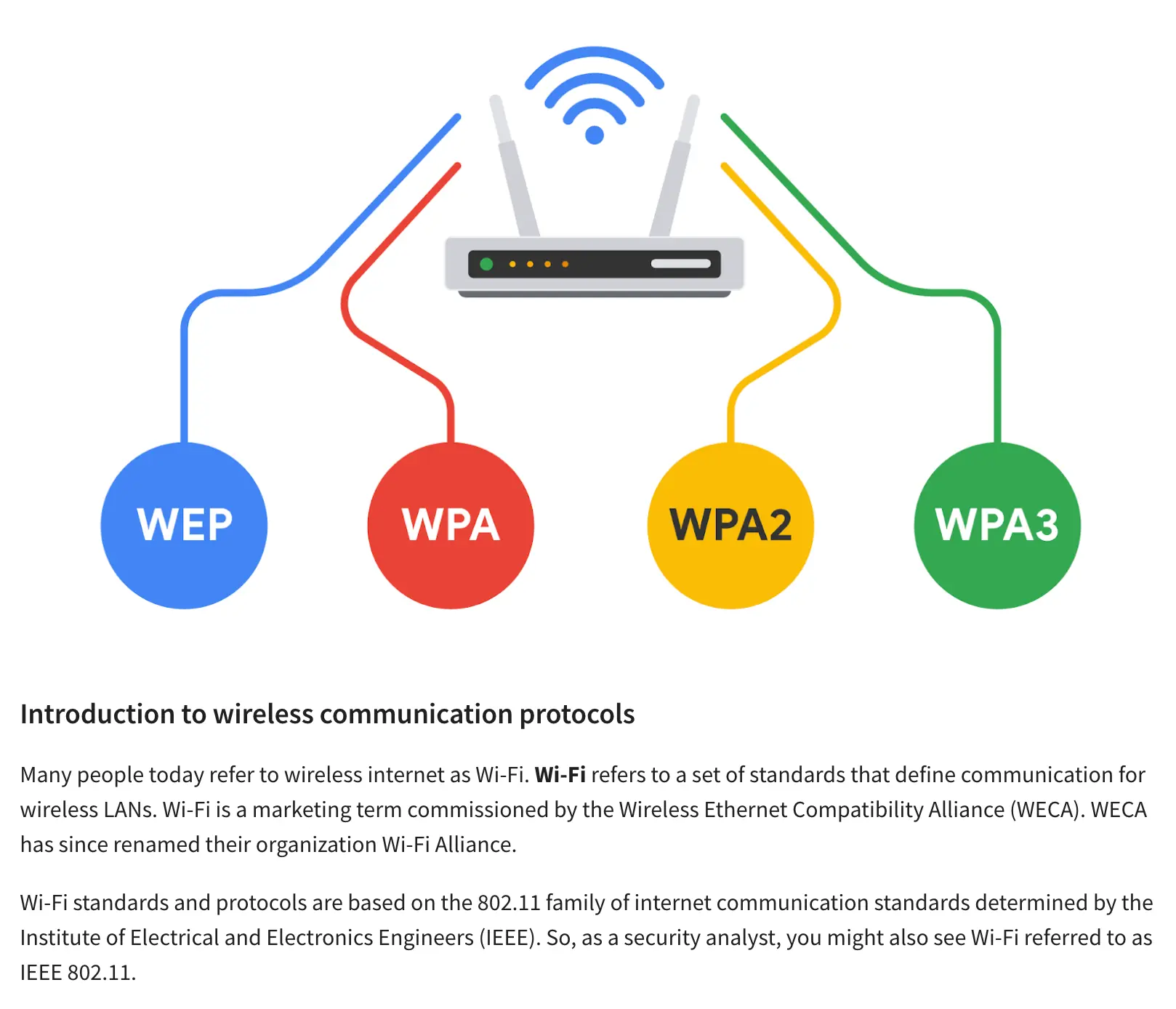
In week 2, you'll learn about firewalls, VPNs, and proxy servers, and in week 3 about DDoS attacks, IP spoofing, and other types of network attacks.
During week 4, you'll learn about security hardening and what actions you can take to make operating systems more secure.
As part of the coursework, your task will be to create an incident report analyzing a network incident using the NIST CSF Framework.
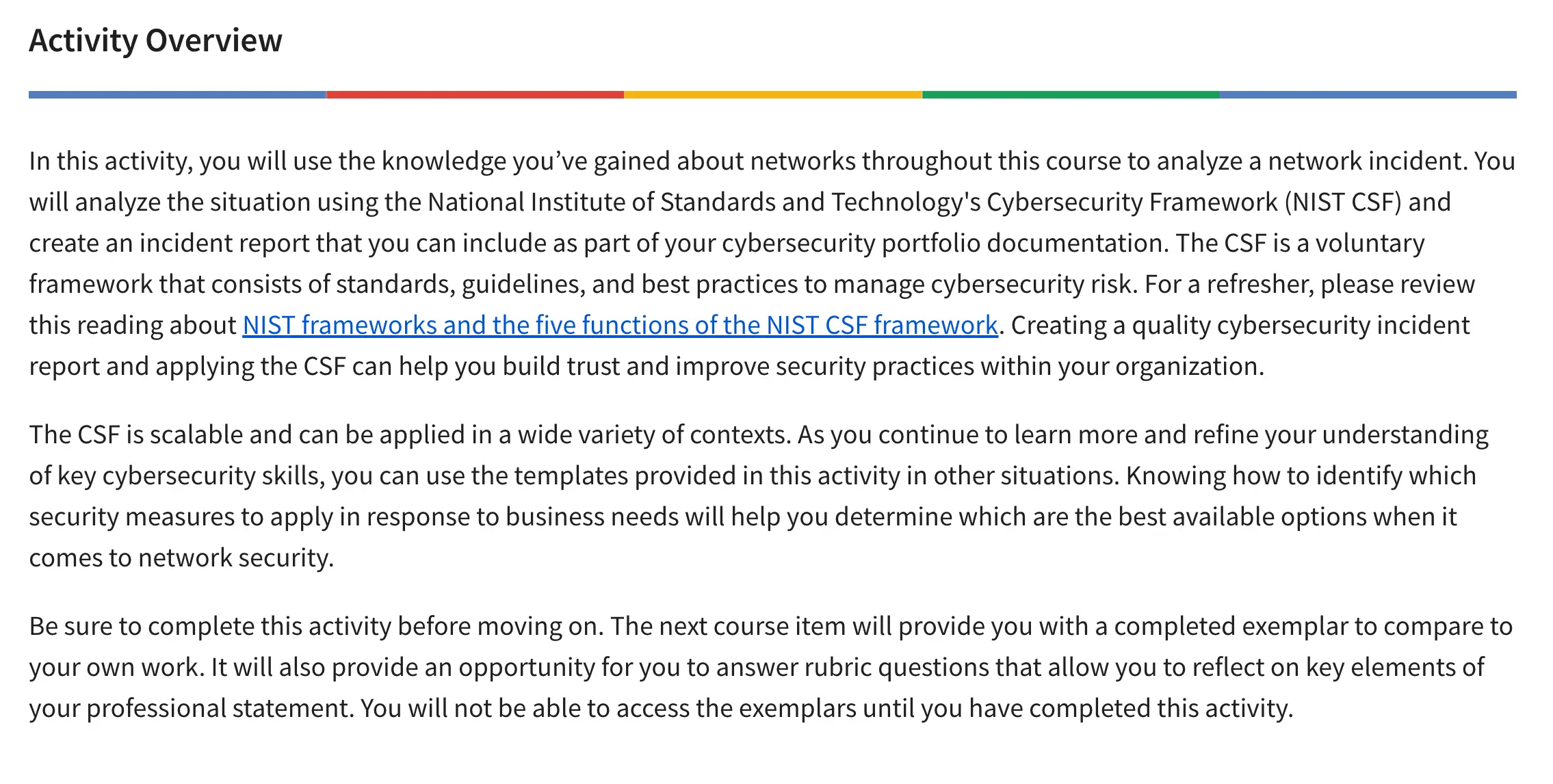
Here is the suggested learning plan for this course.
| Period | Topic | Time To Complete |
|---|---|---|
| Week 1 | Network architecture | 4 hours |
| Week 2 | Network operations | 2 hours |
| Week 3 | Secure against network intrusions | 4 hours |
| Week 4 | Security hardening | 4 hours |
4. Tools of the Trade: Linux and SQL (25 hours)
The Tools of the Trade: Linux and SQL is the fourth course in the series. It discusses operating systems and SQL.
The course starts with an introduction to operating systems and then takes a deeper dive into Linux.

It explains the Linux architecture, how to install Linux, and how to use the shell to run commands.
In week 3, you'll spend around 10 hours learning how to carry out basic tasks in Linux, like file and user management.
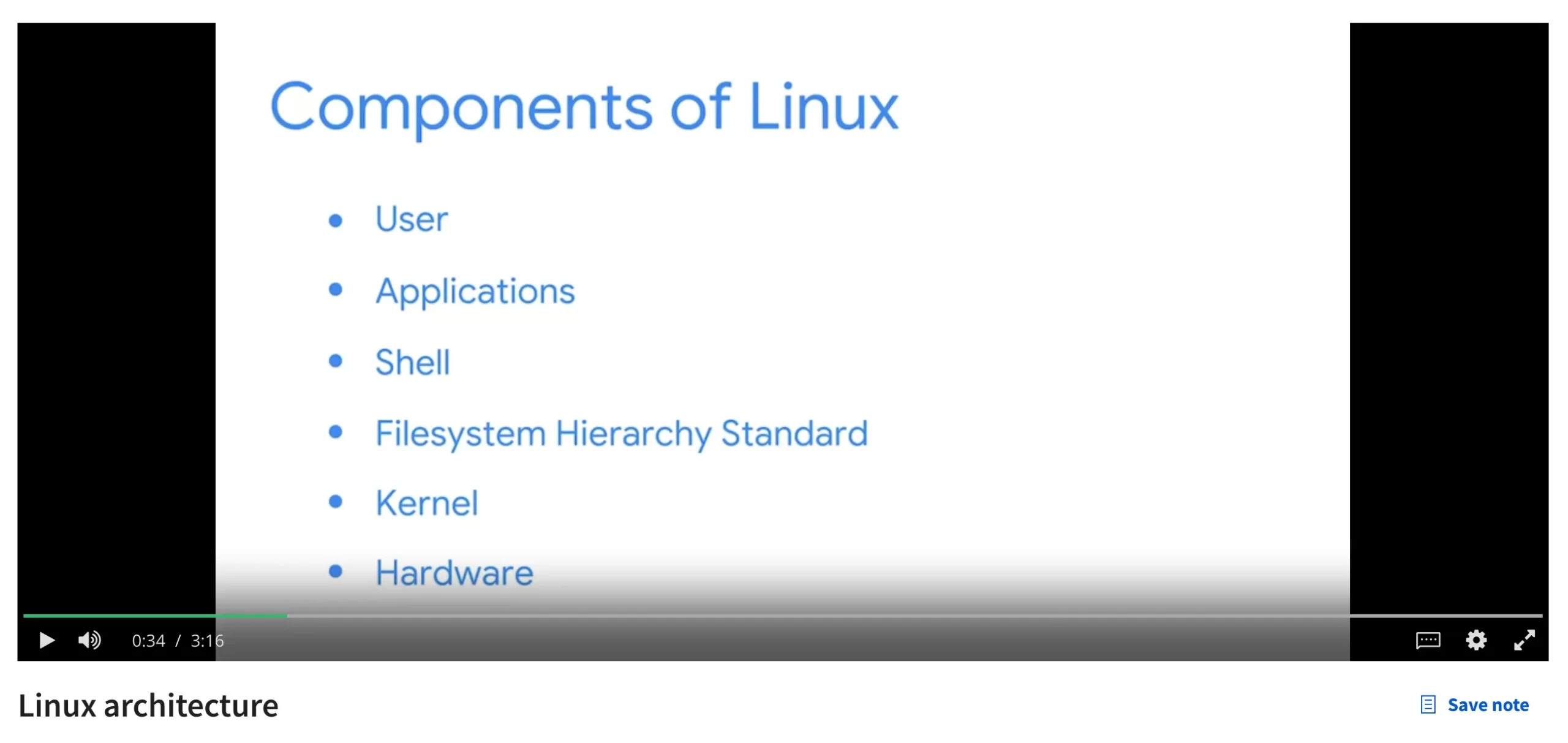
In the last week of the course, you'll learn about SQL. Topics covered include SQL queries, SQL filters, joins, and other basic SQL commands.
As part of the course assessment, you'll have to use SQL to find user login attempts for specific dates based on the given criteria.
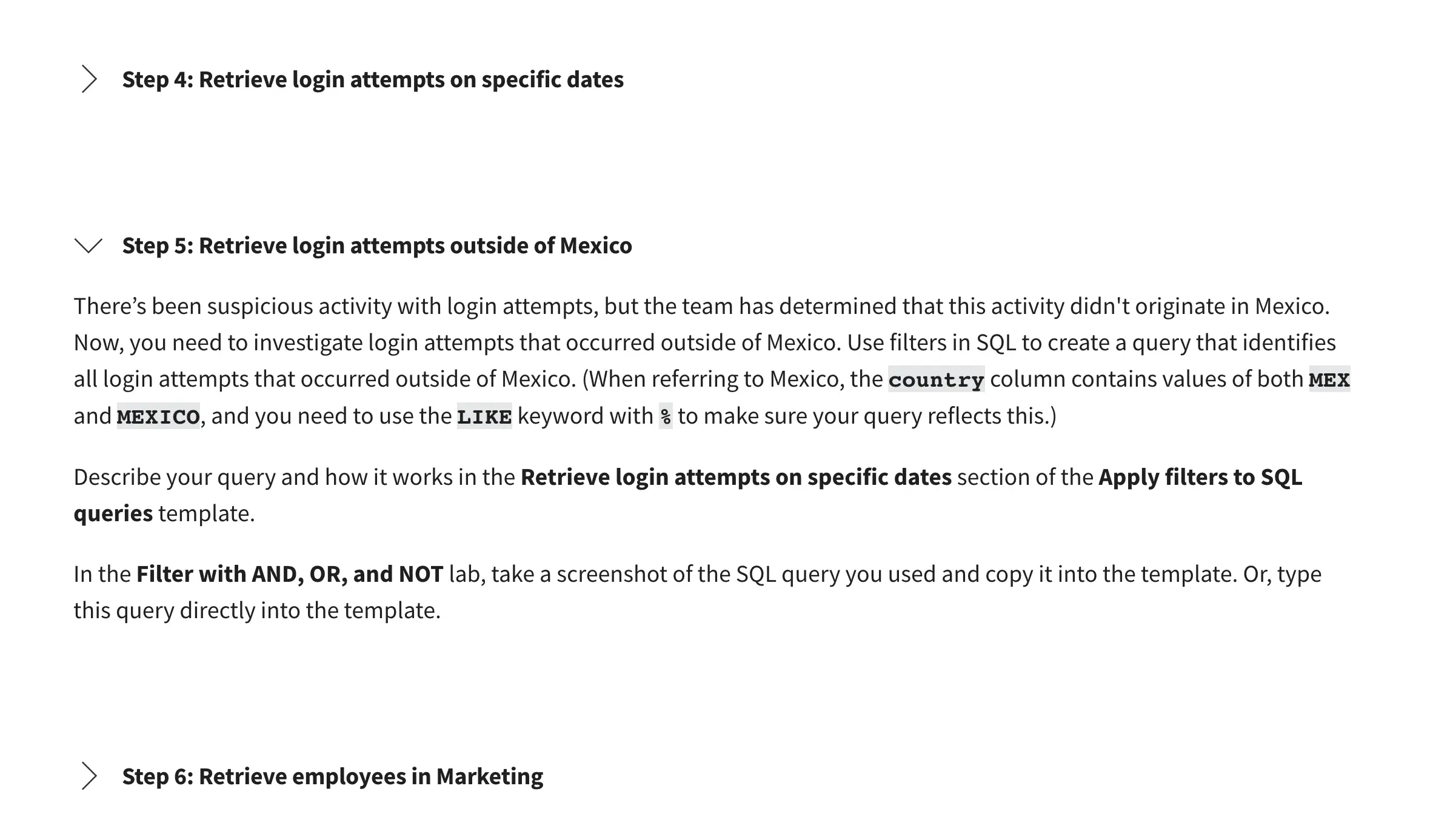
Here are the topics covered each week of the course.
| Period | Topic | Time To Complete |
|---|---|---|
| Week 1 | Introduction to operating systems | 3 hours |
| Week 2 | The Linux operating system | 4 hours |
| Week 3 | Linux commands in the Bash shell | 9 hours |
| Week 4 | Databases and SQL | 9 hours |
5. Assets, Threats, and Vulnerabilities (21 hours)

Assets, Threats, and Vulnerabilities is the fifth course in the Google Cybersecurity certification. Da'Queshia, a security engineer at Google, teaches the course.
The lessons build on the material introduced in the previous course and explain the concepts of assets, threats, and vulnerabilities in detail.
In week 1, you'll develop an understanding of asset classification, the risks associated with each category, and the security controls used by organizations to protect valuable information and mitigate risk.
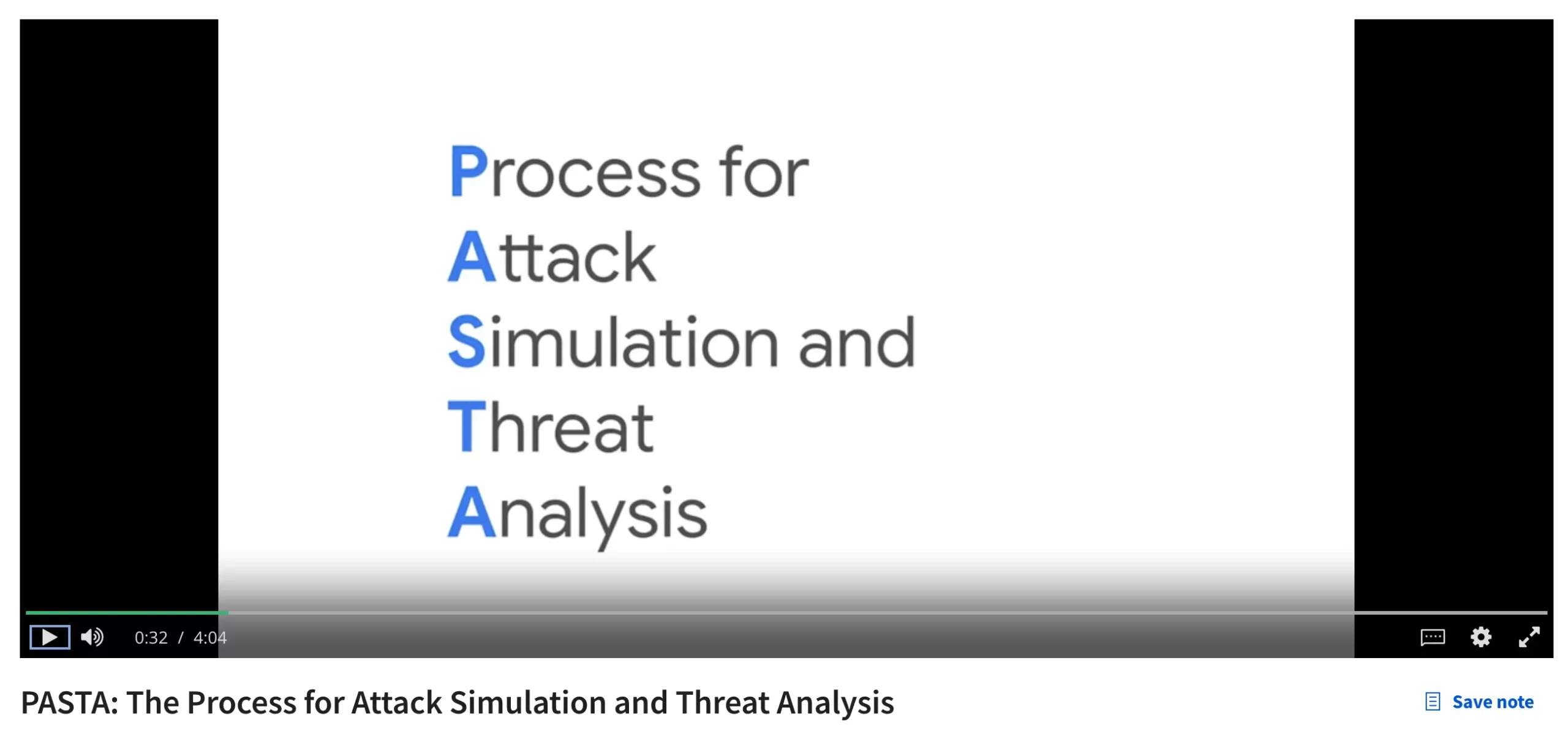
In week 2, you'll learn about data encryption best practices and how user authorization works.
In week 3, you will become familiar with common threats and vulnerabilities. You will develop an attacker mindset by practicing the threat modeling process and learning tactics to avoid security breaches.
In week 4, you'll learn about malware, cross-site scripting, and other data security threats.
The assessment of this course includes 4 graded quizzes. You can see a couple of examples below.
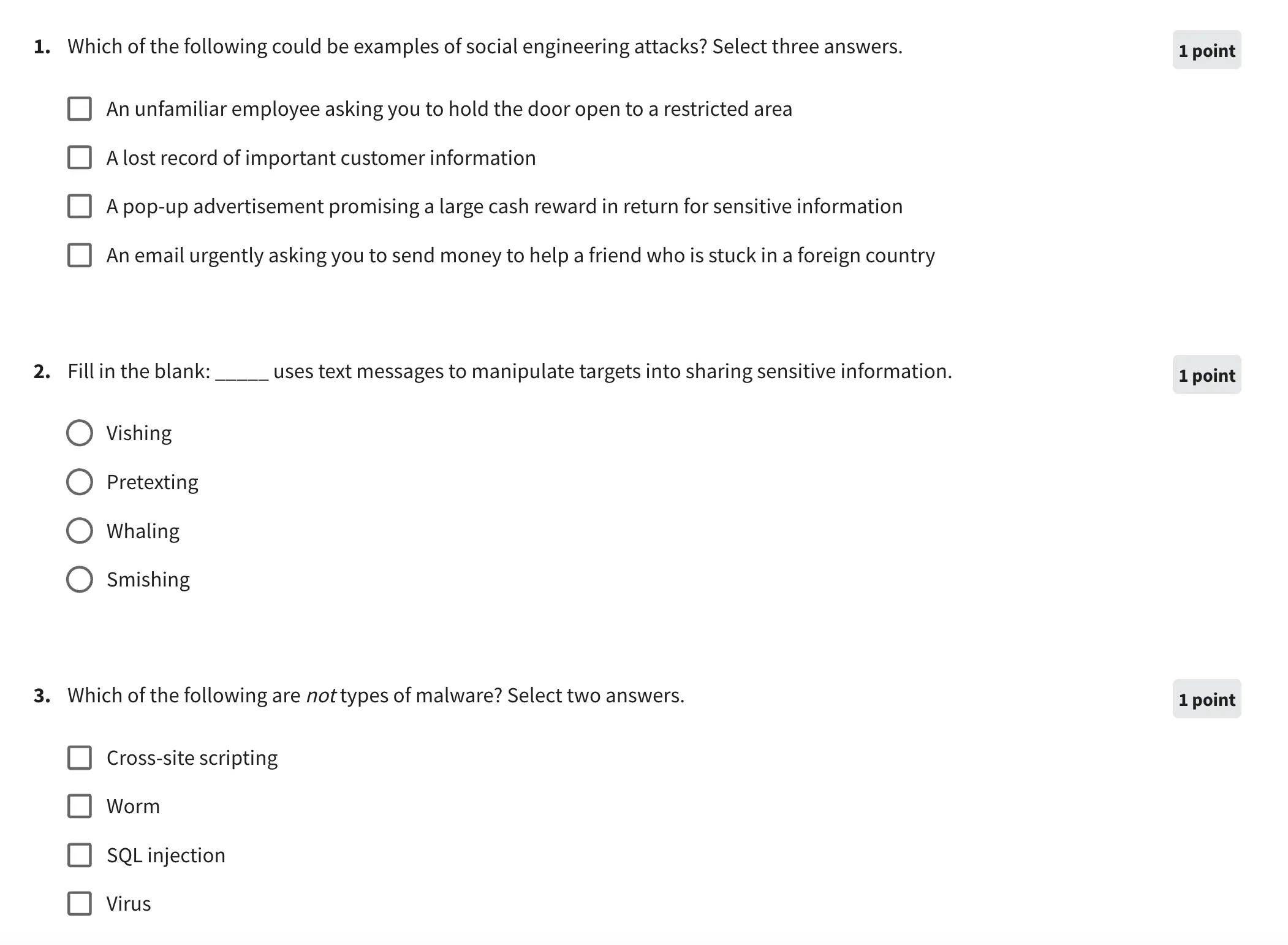
The course takes 20 hours to complete, and the suggested learning plan is the following:
| Period | Topic | Time To Complete |
|---|---|---|
| Week 1 | Introduction to asset security | 4 hours |
| Week 2 | Protect organizational assets | 6 hours |
| Week 3 | Vulnerabilities in systems | 5 hours |
| Week 4 | Threats to Asset Security | 5 hours |
6. Sound the Alarm: Detection and Response (21 hours)
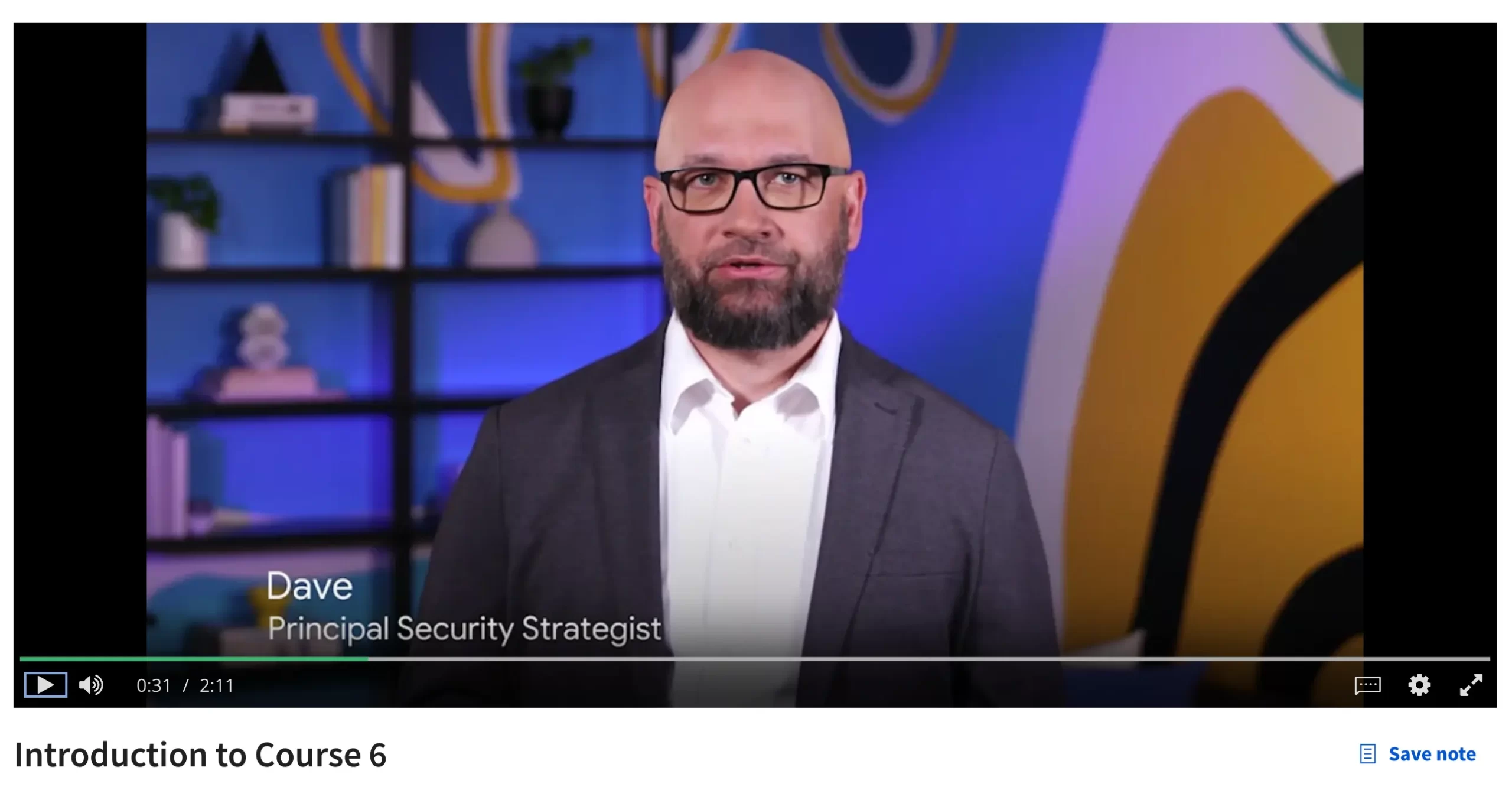
This course teaches you what to do when an incident is detected. You'll learn how to identify incidents and explain the incident response lifecycle, including the roles and responsibilities of cyber security professionals.
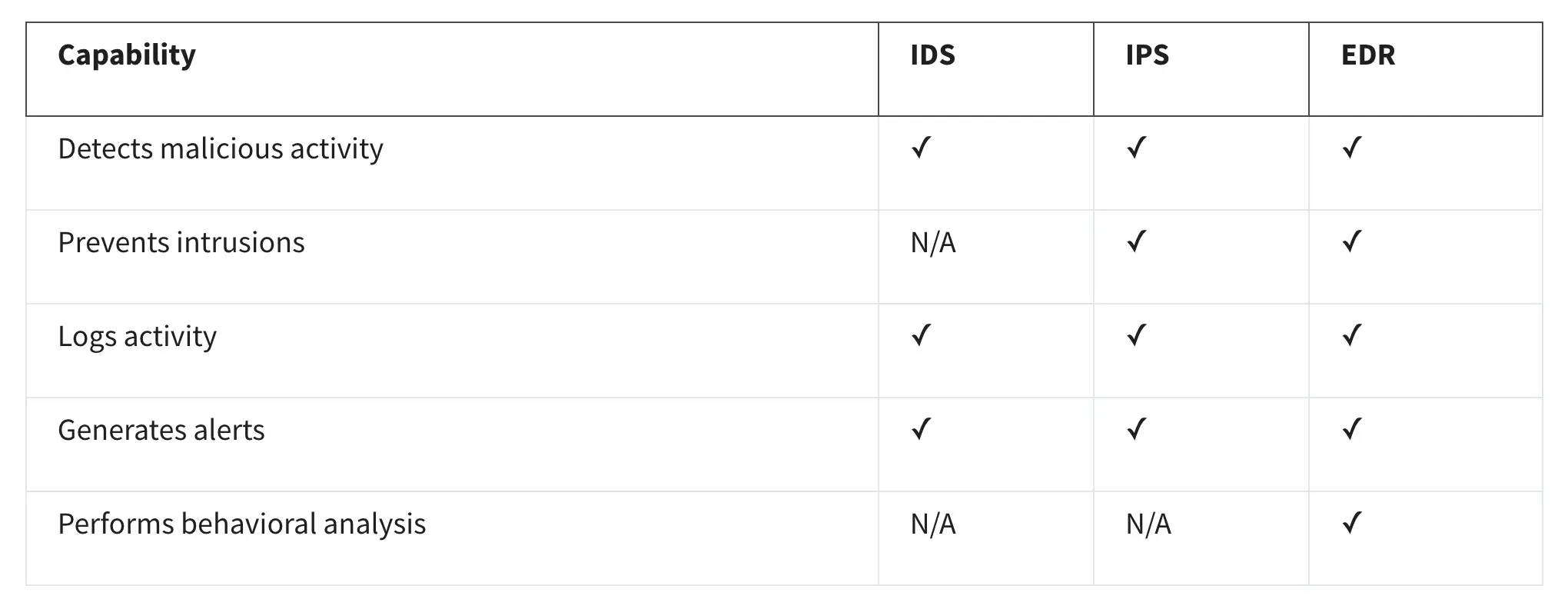
This is the most interesting course in this certification as it explains how to interpret network communications to detect security incidents using packet sniffing tools to capture network traffic. Also, you'll get a chance to practice using IDS and SIEM tools.
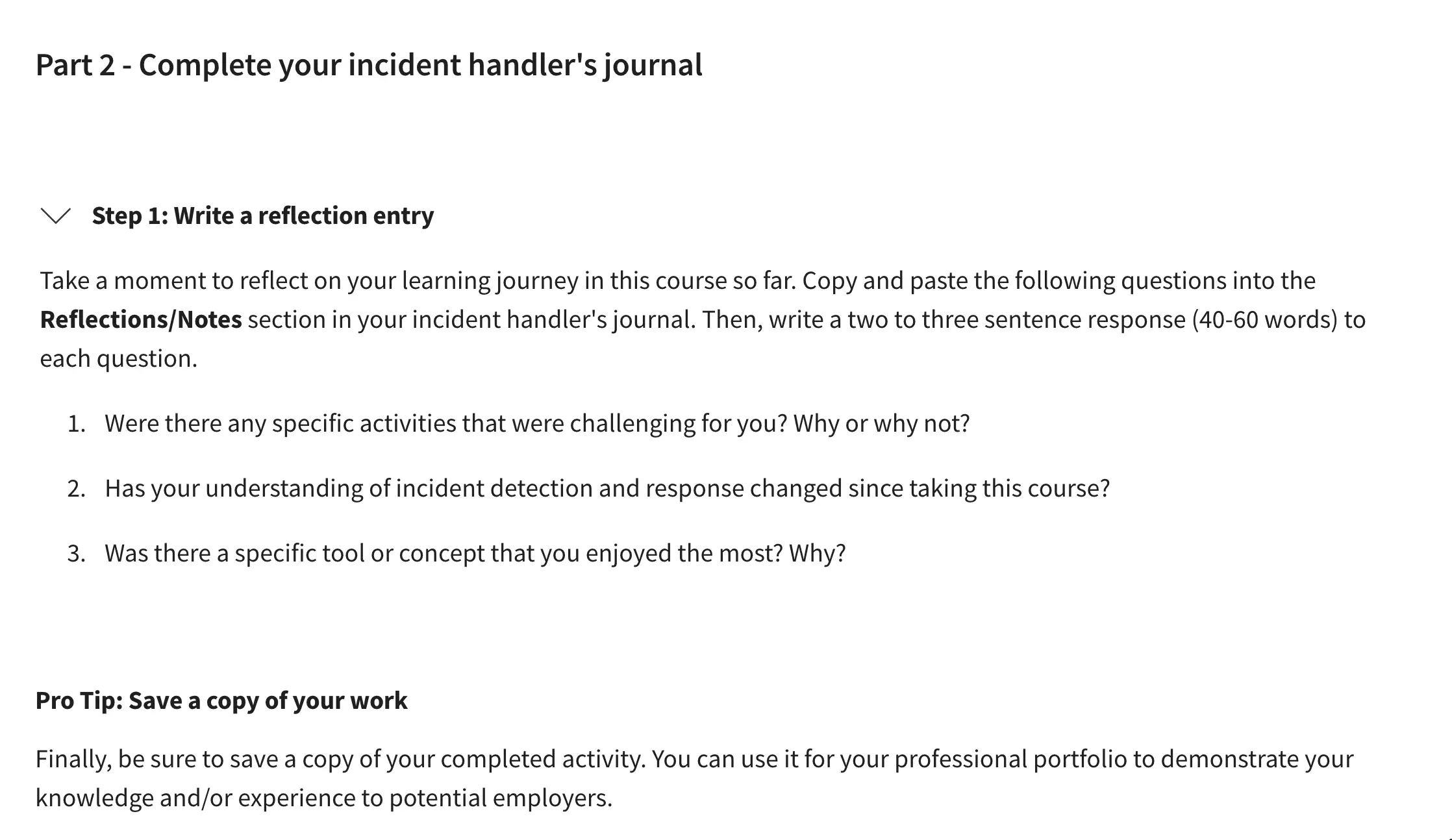
Here is a list of all the lessons covered in this course.
| Period | Topic | Time To Complete |
|---|---|---|
| Week 1 | Introduction to Detection and incident response | 4 hours |
| Week 2 | Network monitoring and analysis | 5 hours |
| Week 3 | Incident investigation and response | 6 hours |
| Week 4 | Network traffic and logs using IDS and SIEM tools | 7 hours |
7. Automate Cybersecurity Tasks with Python (27 hours)

The Automate Cybersecurity Tasks with Python is the seventh course in the series, and it's the longest course with 27 hours of content.
This is the course that you'll either hate (if you don't like programming) or love if you like programming with Python.
Although becoming a good Cybersecurity specialist does not require coding skills, learning how to program in Python will help you automate tasks to save time and become more efficient.
Compared to other Python programming courses, this is a relatively easy course to follow. It is suited for beginners and touches on basic programming concepts and techniques.
If this is your first time working with computer programming, you may have to practice more to improve your coding skills.
Below are a couple of examples of what the programming assignments and quizzes look like.
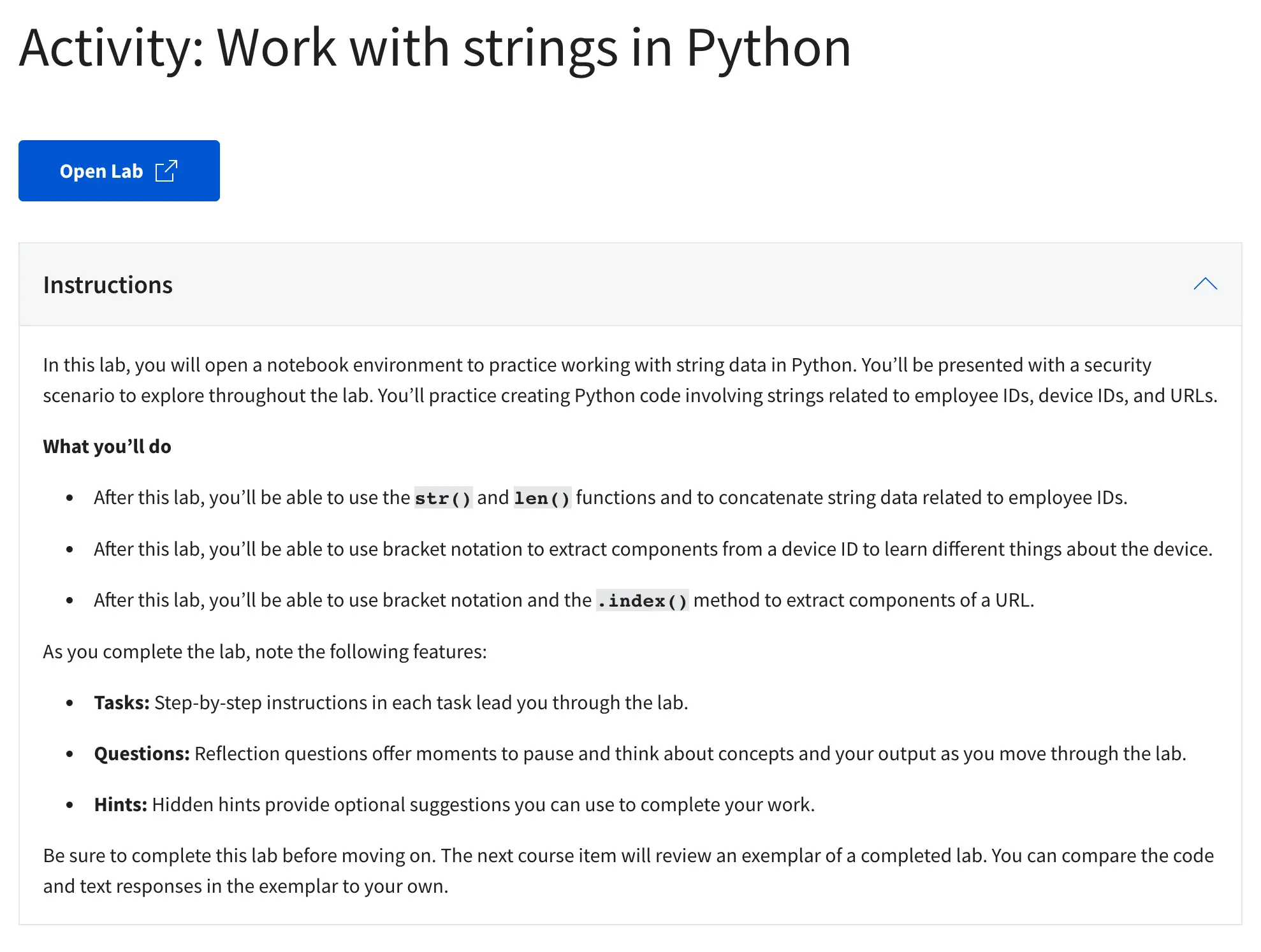
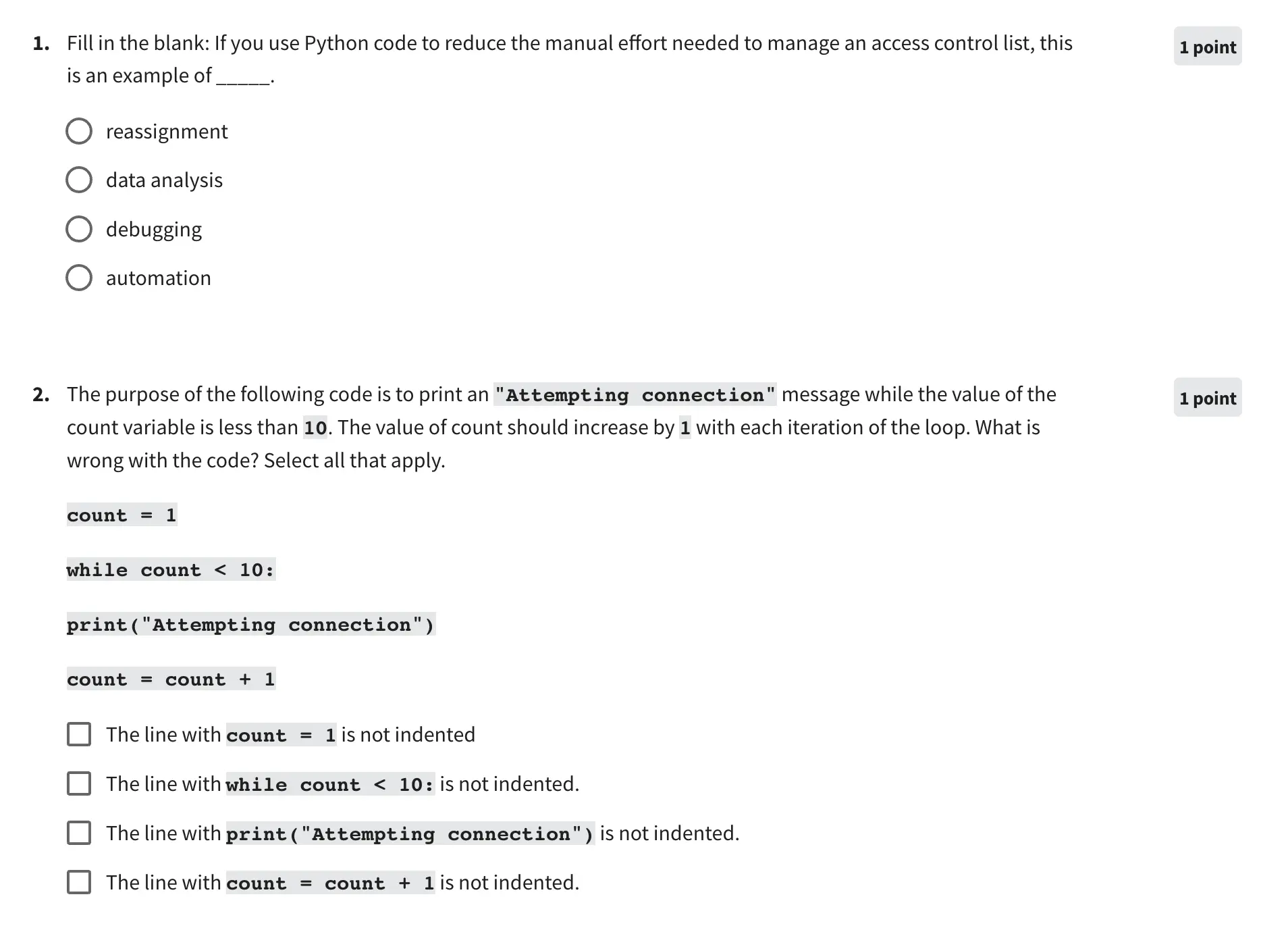
Here is a list of all the lessons covered in this course.
| Period | Topic | Time To Complete |
|---|---|---|
| Week 1 | Introduction to Python | 9 hours |
| Week 2 | Write effective Python code | 5 hours |
| Week 3 | Write effective Python code | 7 hours |
| Week 4 | Python in practice | 7 hours |
8. Put It to Work: Prepare for Cybersecurity Jobs (15 hours)
Once you get to the last and final course, you'll be 15 hours away from earning your Google Cybersecurity certification.
In weeks 1, 2, and 3, you will focus on making decisions and escalating incidents to stakeholders. You'll develop communication and collaboration skills to inform and influence organizational stakeholders. In addition, you'll explore how to operate ethically as a cybersecurity professional.
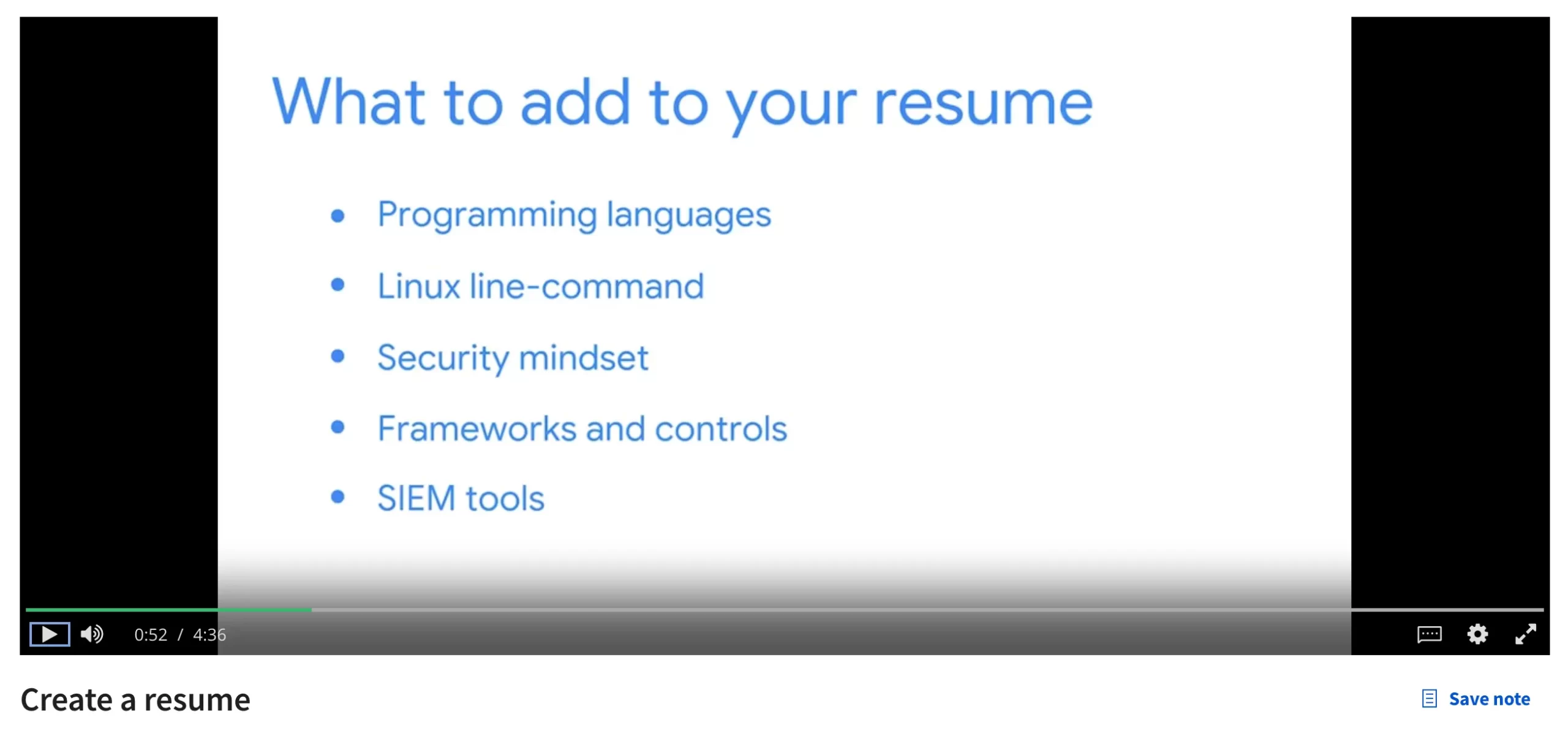
In weeks 4 and 5, the focus is on preparing for cybersecurity jobs and completing practice interviews. You'll learn how to craft your resume and cover letter and where to find related job applications.
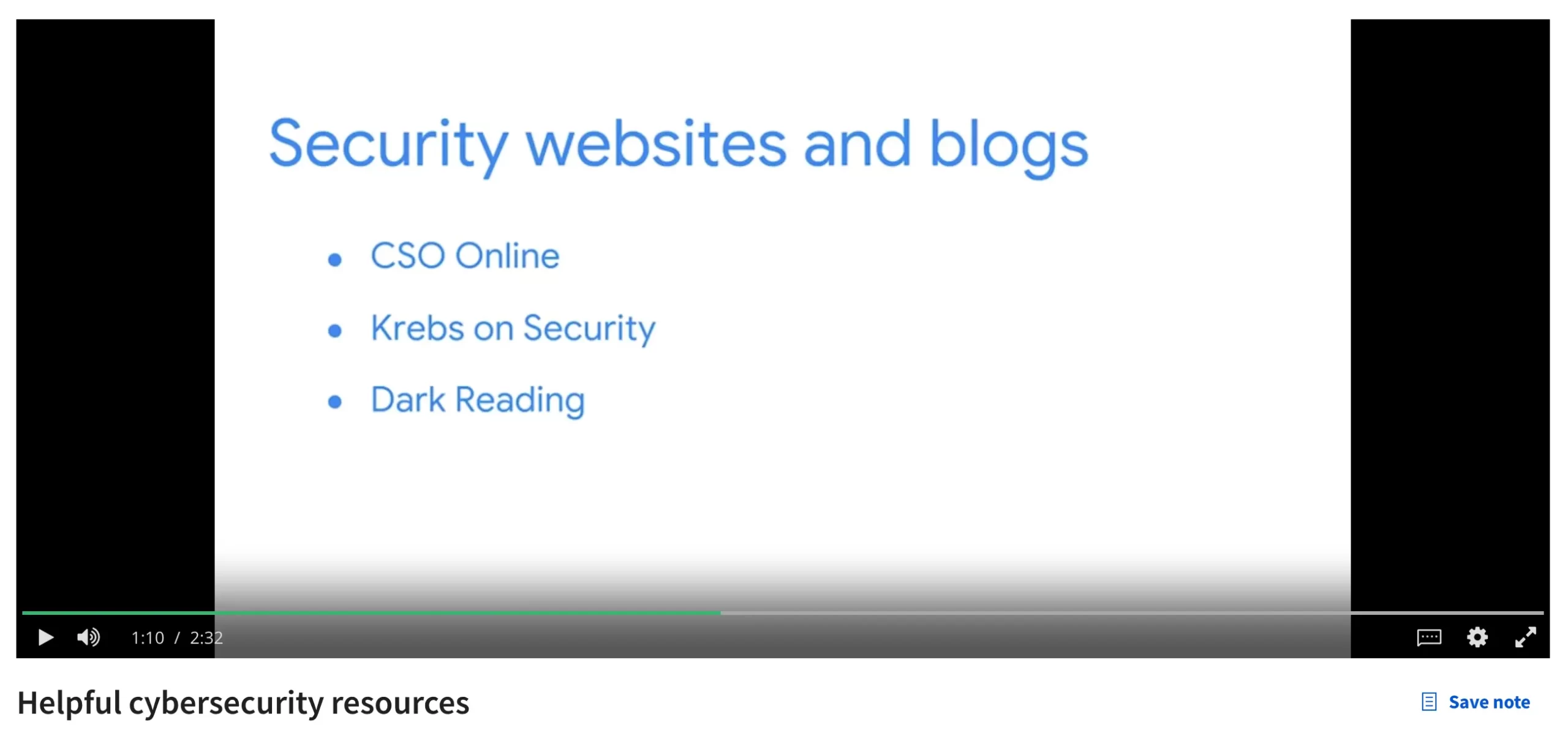
You'll also access 6 videos on how to build AI skills to help you with cybersecurity tasks. In particular you'll learn how to:
- Boost your cybersecurity skills with AI
- Decode complex security frameworks with AI
- Use AI to help identify bugs
- Refine code with help from AI
- Understand system vulnerabilities with AI
- Prioritize alerts with AI
The final step of this certification is to download your bright and shiny Cybersecurity certificate to enrich your CV and LinkedIn profile.
Here is a breakdown of the lessons covered in the last course.
| Period | Topic | Time To Complete |
|---|---|---|
| Week 1 | Protect data and communicate incidents | 3 hours |
| Week 2 | Escalate incidents | 2 hours |
| Week 3 | Communicate effectively to influence stakeholders | 2 hours |
| Week 4 | Engage with the cybersecurity community | 2 hours |
| Week 5 | Find and apply for cybersecurity jobs | 6 hours |
Google Cybersecurity Certification Exams
The Google Cybersecurity Certificate exams consist of quizzes and peer-graded assignments. There are no final exams, but assignments are due at the end of each course.
The passing mark for quizzes is 80%; if you fail to pass a quiz, you can retake it (every 8 hours).
As you can see below, the quizzes' questions are straightforward, and the material covers everything asked.
You are given step-by-step instructions for the assignments; your job is to follow the instructions and complete a task. Other students mark the submitted assignments, and after submission, you also get model solutions.
Other Google Career Certifications
The Google Cybersecurity Certification is a professional certification offered in the Google Career Certification program, which includes eight additional courses.
You can read our detailed reviews of all Google certifications to decide which is the best certification for you,
- Google IT Support Professional Certificate Review
- Google IT Automation Professional Certificate Review
- Google UX Design Professional Certificate Review
- Google Project Management Professional Certificate Review
- Google Digital Marketing and eCommerce Certificate Review
- Google Data Analytics Certificate Review
- Google Advanced Data Analytics Certificate Review
- Google Business Intelligence Certificate Review
You can also consider other Google Certifications covering a range of subjects.
Other Cyber Security Certifications Worth Pursuing
- IBM Cybersecurity Analyst - this is the best alternative certification for beginners in Cybersecurity. The courses are created by IBM and take around 3 months to complete.
- Best Cybersecurity Courses - If you want to explore more options, there are the most precisions Cybersecurity courses in the market.

